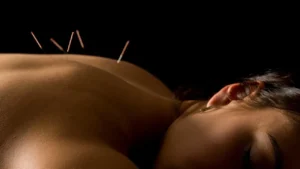The first time I had acupuncture was nine years ago. It’s been one of the most effective treatments I’ve ever had for pain management.
I got my acupuncture tune-up once a month. My naturopath played soft music or nature sounds in a room with the lights dimmed.
She inserted perhaps a couple dozen needles in strategic spots starting with the top of my head, down to the tops of my feet. Needles are placed with precision, and left for under an hour — usually from five to 20 minutes — then removed.
Every month, she did the same thing. Every month I would have a different reaction. Some spots stung, some itched. Many of them had no sensation in response to the needles. I’m not even sure if I know where all the needles went because I didn’t feel some of them.
For a couple of years, I had an ongoing battle with pain, swelling and inflammation that roamed from one area to another. For a year or so the worst of it was in my arms, upper back and hands.
By the time I got home after an acupuncture treatment, my pain level was way down. As the month wore on, the pain would gradually increase. Then it was time for another treatment and around we went.
Eventually I realized that I needed a different desk and seating arrangement while working at my computer. But before that mystery was solved, acupuncture was all that was keeping my arms and hands functional.
According to Mayoclinic.org, traditional Chinese medicine affects the flow of qi which is thought to move along meridians or pathways throughout the body.
Its traditional use in the centuries since it originated in China has been to modify and restore the balance of the flow of energy or qi (pronounced chee). Rebalancing is believed to occur when needles are placed strategically.
Acupuncture has been implemented in traditional Chinese medicine for a range of conditions, both physical and emotional. The Western view is more focused on the observable connective tissue, muscles and nerves.
Each practitioner will have their own unique mix of Eastern and Western perspectives.
Response to acupuncture will also be unique to the individual patient. Some, like me, have quick and strong response. Others less so, and some may notice nothing at all.
Resting after acupuncture is recommended, with the aim of getting the most out of the treatment, giving the body opportunity to reap the benefits.
Dr. Andrew Weil, director of the Arizona Center for Integrative Medicine at the University of Arizona, makes some recommendations about acupuncture. Educated at Harvard, he is the founder and chairman of The Weil Foundation, and the Chairman of Weil Lifestyle. Weil is a leading voice for integrative medicine, medicinal plants and alternative medicine.
Have you tried acupuncture? If you haven’t, Dr. Weil suggests some reasons to think about going for a session with the needles:
1) Pain Relief
Weil said that a 2010 edition of Nature Neuroscience reported that the release of the amino acid adenosine from the skin was found to play a role in pain relief when acupuncture is performed. According to Mayoclinic.org, acupuncture may increase natural painkillers and increase blood flow throughout the body.
Research has indicated that acupuncture is beneficial for dental pain, fibromyalgia, labor, neck and lower back pain, menstrual cramps, rheumatoid arthritis and osteoarthritis.
2) Neurological Benefits
Acupuncture can bring relief from conditions such as migraines and some symptoms of Parkinson’s disease.
3) Rehabilitation Assistance
Recovery from conditions such as stroke may be aided by the use of acupuncture treatments.
4) Respiratory Issues
Asthma and sinusitis are some of the respiratory ailments that may benefit from acupuncture.
5) Reproductive Problems
Women may experience relief from reproductive dysfunction such as infertility and some gynecologic disorders.
6) Emotional Matters
Post-traumatic stress disorder may decrease for those who have acupuncture.
7) Gastric Distress
Nausea and vomiting after chemotherapy treatments may ease up after acupuncture.
8) Addictions and Fatigue
It may be helpful for those struggling with addictions and dealing with fatigue.
Visit Jody’s website at http://www.ncubator.ca





